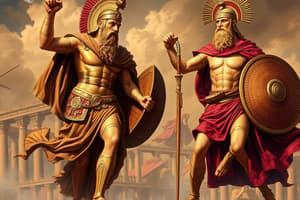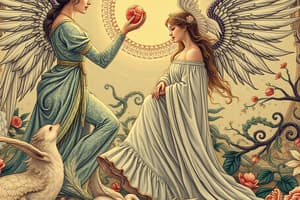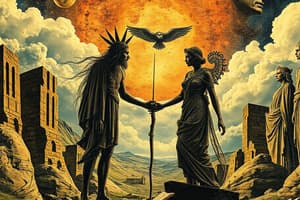Podcast
Questions and Answers
Who leads the Olympians in the war against the Titans?
Who leads the Olympians in the war against the Titans?
- Poseidon
- Cronus
- Hades
- Zeus (correct)
Hera is the ruler of the sea.
Hera is the ruler of the sea.
False (B)
What is the primary theme represented by the Olympians' victory over the Titans?
What is the primary theme represented by the Olympians' victory over the Titans?
The transition from chaos to order.
Zeus assigns roles to his siblings and allies to create a structured divine ________.
Zeus assigns roles to his siblings and allies to create a structured divine ________.
Match the following gods with their domains:
Match the following gods with their domains:
Which goddess is known for her role in domesticity?
Which goddess is known for her role in domesticity?
The myth of cosmic succession reflects generational struggles and societal tensions.
The myth of cosmic succession reflects generational struggles and societal tensions.
Who ensures the survival of Zeus in the myth of succession?
Who ensures the survival of Zeus in the myth of succession?
What does the term 'Hamartia' refer to in heroic myths?
What does the term 'Hamartia' refer to in heroic myths?
Heroes in myths are often depicted as immortal.
Heroes in myths are often depicted as immortal.
What are the Twelve Labors of Heracles a metaphor for?
What are the Twelve Labors of Heracles a metaphor for?
Perseus uses a mirrored shield to defeat __________.
Perseus uses a mirrored shield to defeat __________.
Match the following heroes with their significant deeds:
Match the following heroes with their significant deeds:
What is the primary theme in the heroic journey structure?
What is the primary theme in the heroic journey structure?
The concept of 'Kleos' refers to the pursuit of wealth by heroes.
The concept of 'Kleos' refers to the pursuit of wealth by heroes.
What role does divine assistance play in heroic myths?
What role does divine assistance play in heroic myths?
Which entity represents the primordial state of Chaos in Greek mythology?
Which entity represents the primordial state of Chaos in Greek mythology?
Cronus castrated Uranus to establish himself as the new ruler of the cosmos.
Cronus castrated Uranus to establish himself as the new ruler of the cosmos.
Who are the hundred-handed giants created from Uranus's blood?
Who are the hundred-handed giants created from Uranus's blood?
Gaia gives birth to ______ and marries him, forming the primordial union of earth and sky.
Gaia gives birth to ______ and marries him, forming the primordial union of earth and sky.
Match the following beings with their descriptions:
Match the following beings with their descriptions:
What was Rhea's plan to save Zeus from being swallowed by Cronus?
What was Rhea's plan to save Zeus from being swallowed by Cronus?
Name one of the forces that emerged from Chaos.
Name one of the forces that emerged from Chaos.
Cronus feared that his children would overthrow him and swallowed each child at birth.
Cronus feared that his children would overthrow him and swallowed each child at birth.
Flashcards
Chaos
Chaos
The formless, chaotic void at the beginning of the universe in Greek mythology.
Gaia
Gaia
The personification of the Earth in Greek mythology, giving birth to the sky and other primordial entities.
Tartarus
Tartarus
The deep abyss below the earth in Greek mythology, often associated with punishment and imprisonment.
Eros
Eros
Signup and view all the flashcards
Nyx
Nyx
Signup and view all the flashcards
Erebus
Erebus
Signup and view all the flashcards
Uranus
Uranus
Signup and view all the flashcards
Titans
Titans
Signup and view all the flashcards
Titanomachy
Titanomachy
Signup and view all the flashcards
Heroic Age
Heroic Age
Signup and view all the flashcards
Regurgitation of the Titans
Regurgitation of the Titans
Signup and view all the flashcards
Underworld
Underworld
Signup and view all the flashcards
Arete
Arete
Signup and view all the flashcards
Divine Lineage
Divine Lineage
Signup and view all the flashcards
Succession and Conflict
Succession and Conflict
Signup and view all the flashcards
Role of Women in Creation
Role of Women in Creation
Signup and view all the flashcards
Pursuit of Glory (Kleos)
Pursuit of Glory (Kleos)
Signup and view all the flashcards
Conflict and Resolution
Conflict and Resolution
Signup and view all the flashcards
Theseus
Theseus
Signup and view all the flashcards
Call to Adventure
Call to Adventure
Signup and view all the flashcards
Heracles (Hercules)
Heracles (Hercules)
Signup and view all the flashcards
Mortality and Legacy
Mortality and Legacy
Signup and view all the flashcards
Interaction with the Divine
Interaction with the Divine
Signup and view all the flashcards
Study Notes
Myths of Creation and the Structure of the Cosmos
- Greek mythology describes the cosmos's creation, emphasizing chaos and order.
- Chaos was the initial formless void, from which other entities emerged.
- Gaia (Earth), Tartarus (abyss), Eros (desire), Nyx (night), and Erebus (darkness) were primordial entities.
- Gaia gave birth to Uranus (sky), uniting earth and sky in a primordial union.
- The Titans, Cyclopes, and Hecatoncheires were their offspring, representing elemental and cosmic forces.
- Uranus feared his children, imprisoning them within Gaia, leading to a conflict.
- Cronus, the youngest Titan, castrated Uranus, becoming the new ruler.
- Cronus feared his own children and swallowed them, but Rhea saved Zeus.
- Zeus led an overthrow of Cronus and the Titans (Titanomachy), establishing his rule.
The Succession Myth: Struggles for Cosmic Power
- Uranus's fear and imprisonment of his children caused conflict.
- Gaia's plan led Cronus to overthrow Uranus.
- Cronus, fearing a prophecy, swallowed each child he had with Rhea.
- Rhea tricked Cronus by giving him a stone instead of their child, Zeus.
- Zeus overthrew Cronus and the Titans.
Cosmic Order and the Olympian Rule
- Zeus became the supreme ruler of the gods.
- He established a structured divine hierarchy, assigning roles to his siblings and allies, like Poseidon, Hades, Hera, Demeter, and Hestia.
Symbolism and Interpretation
- The myth of cosmic succession reflects generational struggles and the cyclical nature of power.
- Gaia's and Rhea's roles illustrate the power of women in shaping the cosmos.
- Order emerging from chaos symbolizes the progression from disorder to stability.
The Heroic Age: Heroes as Cultural Icons
- Greek mythology's Heroic Age portrays larger-than-life figures exemplifying bravery, skill, and human imperfection.
- Heroes often have divine lineage but remain mortal.
- Key characteristics of heroes include excellence (arete), flaws (hamartia), pursuit of glory (kleos), and conflict resolution.
- Their struggles and achievements resonate with human experiences.
- Conflicts with monsters and challenges symbolize humanity's struggle for order.
The Nature of Heroic Myths
- Heroic myths focus on conflict and resolution, with heroes facing significant challenges.
- The conflict often underscores humanity's struggle against chaos and adversity.
- Mortality and legacy are prominent themes, emphasizing the fleeting nature of human existence.
- Interaction with the divine reflects the tension between human effort and fate.
Prominent Figures and Narratives
- Heracles (Hercules) is known for the Twelve Labors, striving towards order.
- Perseus is renowned for slaying Medusa and overcoming threats.
- Theseus embodies intelligence, courage, and justice, defeating the Minotaur.
The Heroic Journey: Structure and Symbolism
- The stages of the hero's journey include the call to adventure, trials and challenges, and the return and legacy.
- Heroes undergo trials highlighting personal growth, and achieving victories to achieve heroic status.
Symbolism and Cultural Context
- Heroes reflect societal values, acting as moral exemplars.
- Their actions reinforce cultural values, such as loyalty, perseverance, and respect for the gods.
- Myths often teach lessons like humility by cautionary tales or through demonstrating the transient nature of human existence.
Studying That Suits You
Use AI to generate personalized quizzes and flashcards to suit your learning preferences.




